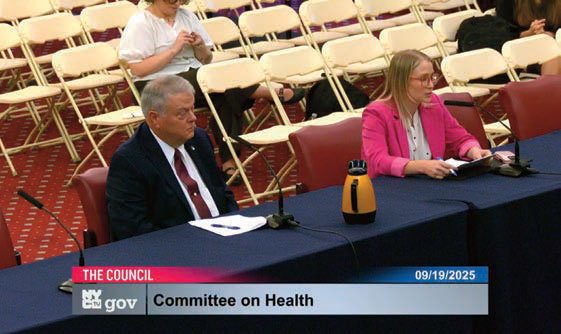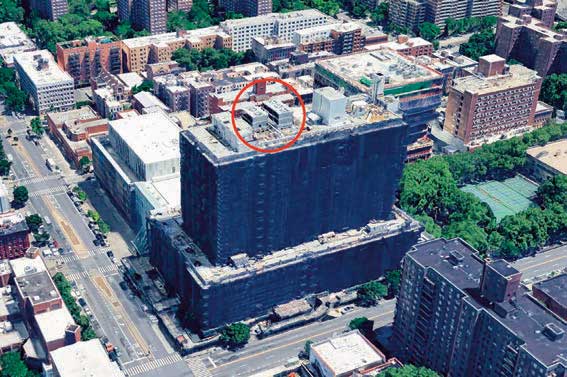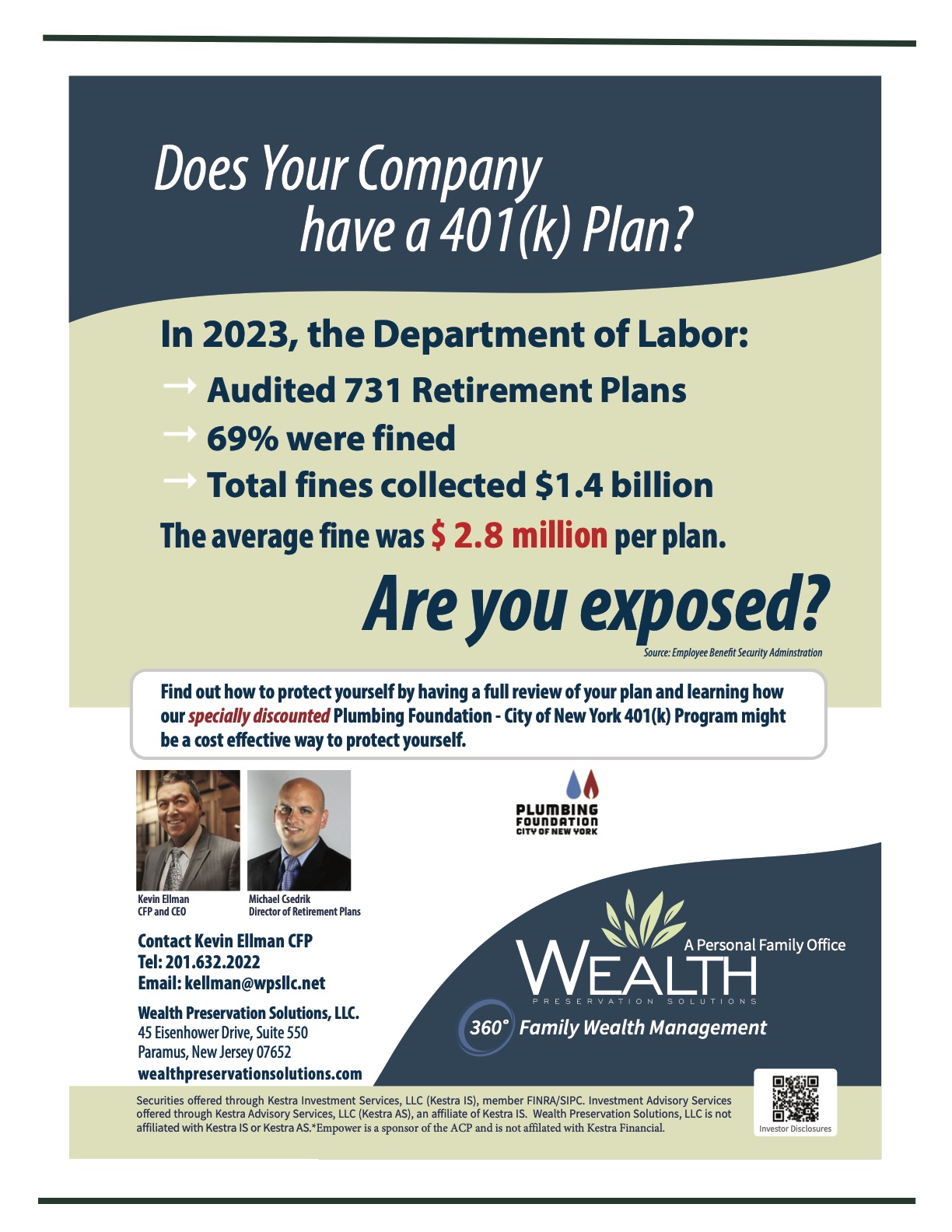Since 1962, the most reliable source of information on NYC’s plumbing industry.
Pipecaster Issue 3: Vol. 48
Click here for a PDF version of this issue of Pipecaster
Op-ed: How the city can help prevent deadly outbreaks of Legionnaires’ Disease
By April M. McIver
In light of the most recent outbreak of Legionnaires’ Disease in Harlem, we are urging the Mayor’s Office, the New York City Department of Health and Mental Hygiene (DOHMH) and the City Council to work together to implement stronger safety measures to stop the spread of Legionella bacteria throughout New York City.
As a non-profit organization representing union and non-union plumbing contractors, engineering associations, supply houses and manufacturers across the City, our members recognize the importance of properly maintaining a building’s water system — and what can go wrong when that fails to happen.
Our government leaders and elected officials must put an end to these recurring outbreaks that needlessly jeopardize the lives of our most vulnerable New Yorkers, including the elderly and those who are immuno-compromised. Such incidents cause heartache and uncertainty for so many families, year after year. We need common-sense regulations that require more inspections, more testing and more oversight in order to properly safeguard our buildings and communities.
A bill is pending before the City Council that would move us in a safer direction. The bill would expand upon the existing testing and maintenance requirements of cooling towers to the building’s water system where Legionella bacteria frequently grow. However, we strongly recommend the bill be amended to include detailed qualification, reporting, and transparency requirements so we can properly address domestic/potable water systems. There is overwhelming scientific evidence that such systems are a major source of Legionella.
Properly maintaining the entire building water system — not just cooling towers — is critical to preventing fatal incidents from striking again. According to the U.S. Centers for Disease Control and Prevention (CDC), there has been an increase of more than 550% of reported cases of Legionnaires’ Disease between 2000 and 2017 with an estimated 8,000 to 18,000 cases annually. While the most frequent outbreaks of Legionella were from hotels, health care facilities and other similar buildings, potable water was the most frequent source of exposure.
In 2016, the City Council passed a law requiring maintenance between 2000 and 2017 with an estimated 8,000 to 18,000 cases annually. While the most frequent outbreaks of Legionella were from hotels, health care facilities and other similar buildings, potable water was the most frequent source of exposure.
In 2016, the City Council passed a law requiring maintenance of cooling towers to help prevent the spread of Legionella. While this law and ensuing regulations passed by DOHMH have certainly assisted in the prevention of Legionnaires’ disease outbreaks that would otherwise stem from poorly maintained cooling towers, the City’s laws fail to address domestic/potable water systems, and we have seen outbreaks every year since. Several research-based organizations have called for policymakers to address these systems in order to control the spread of Legionella more effectively.
We urge the Council to pass Int. 434-2024 with some amendments that would require building owners to take important actions, as suggested by science-backed research, including the creation of a building water system management program and plan and the use of disinfectants and environmental monitoring by use of Legionella culture tests.
To ensure compliance, the DOHMH would have enforcement authority and be allowed to inspect building properties at any time and to issue penalties for non-compliance. The proposed legislation would increase transparency by requiring DOHMH to publish its procedures for identifying and addressing Legionnaires’ disease outbreaks and clusters and requiring all reports to be made publicly available. Building owners also would be required to notify residents and visitors of the presence of Legionella.
New Yorkers of all ages can be exposed to Legionella simply by washing their hands and face, showering, or brushing their teeth (if aerosols containing the bacteria are inhaled into the lungs), and therefore, we deserve a stronger, smarter and safer citywide plan to fight this deadly disease.
In recent years, our calls to work with DOHMH officials to strengthen such regulations have gone unanswered, and it is time for a new, proactive approach to address this public safety crisis and better protect the millions of people who live, work and visit here.
The City owes it to the families of the seven recent victims to improve its policies and prevent future outbreaks, and amending and passing Int. 434-2024 is a solid step in that direction.
This tragedy is a wake-up call none of us can afford to ignore.
This article originally appeared in Crain’s on September 19, 2025:
https://www.crainsnewyork.com/op-ed/op-ed-city-can-prevent-legionnaires-disease-outbreaks
NEW DOB Course Provider Rules: What it means for License Renewal
As the industry is likely aware, the NYC Department of Buildings (DOB) issued proposed rule changes related to course providers on December 31, 2024. Among the changes proposed, the Department sought to ban any third party provider relationships, including the Construction Trades License Training Corp. (CTLTC) with SUNY Empire University. CTLTC commented in opposition to this with the recommendation to require disclosure of agreements and relationships to DOB rather than a blanket ban. CTLTC has been offering master plumber and master fire suppression contractor license renewal courses since 2002, and working with SUNY Empire since 2014. CTLTC is a reputable program and even includes instruction from NYC DOB personnel. DOB disregarded industry feedback that this decision would be detrimental to the plumbing and fire suppression industries, and adopted the rules including the third-party ban, effective June 19, 2025.
Due to the new rules, the CTLTC ceased course offerings as of June 2025. There are other course providers offering master plumber and master fire suppression contractor license renewal courses, according to DOB’s own website, but as CTLTC has become aware there are providers under investigation as well as providers that list the course as available but are not in fact offering the license renewal course. This is clearly a detriment to licensees.
CTLTC is seeking DOB-approved accreditation and, following, DOB course provider status to return as the lead license renewal provider for NYC licensed master plumbers and master fire suppression contractors. We anticipate returning to operations in 2026. We will continue to keep the industry updated.
In the meantime, you can visit the DOB’s course provider website to determine what other providers may offer license renewal courses.
www.nyc.gov/site/buildings/safety/dob-approved-course-provider-list.page
NYC Council Committee on Health Legionella Oversight Hearing
On Friday, September 19, 2025, the NYC Council Committee on Health, Chaired by Lynn Schulman, held an oversight hearing in response to the recent Harlem outbreak leading to more than 100 people sickened, 90 hospitalized, and 7 deaths.
The NYC Department of Health and Mental Hygiene (DOHMH) testified first, Commissioner Dr. Michelle Morse and Deputy Commissioner for Environmental Health Corinne Schiff spoke and were questioned by the City Council, including Speaker Adrienne Adams, for over two hours.
The DOHMH Commissioner and Deputy Commissioner did not have good answers for the delay in public notification on August 14th (given they were notified and began investigation on July 25), the lack of oversight and enforcement of cooling tower registration and inspections, and still are in denial that building water systems are a source of legionella despite several cases this past August in the Parkchester South Condominiums which were confirmed to be linked to the hot water system.

L to R: Arthur Klock, UA Local 1 Trade Education Director; April McIver, Plumbing Foundation Executive Director

The Plumbing Foundation applauds the Council and Speaker Adams, as well Council Member Pierinia Sanchez as sponsor of Int. 434, for asking the right and necessary questions of DOHMH and for pushing for vital policy changes to prevent another deadly outbreak.
THERE ARE CONSTANT UPDATES AND NEWS THAT IMPACT THE PLUMBING INDUSTRY.
WANT TO BE ADDED TO THE FOUNDATION’S E-BLAST TO BE CURRENT? IF YES, DON’T HESITATE TO GET IN TOUCH WITH US AT INFO@PLUMBINGFOUNDATION.ORG TO BE ADDED TO OUR LISTSERVE.
THE PIPECASTER is published by the Plumbing Foundation City of New York, Inc.
Lawrence J. Levine, Chairman; Louis J. Buttermark, Vice Chairman; Barr Rickman, Treasurer; April McIver, Executive Director; Terence O’Brien, Editor. Board of Directors: Anthony D. Altimari, Paul Belli, Marc Breslaw, Louis J. Buttermark, Harris Clark, Alex Greenberg, Nicholas Katragis, Angelo Lemodetis, Lawrence J. Levine, Scott Lyons, Barr Rickman, Richard Turchiano
REMINDER: NYC DOB Worker Wallet Card in Effect
As a reminder, as of July 1, 2025, plumbing technicians who intend to conduct Local Law 152 periodic gas inspections on behalf of the Licensed Master Plumber (LMP) for whom they work, must have their 7-hour periodic gas training certification on the NYC Department of Buildings (DOB) “worker wallet” card. Please note LMPs themselves do NOT need a worker wallet card to conduct these inspections. LMPs have the ability to have this safety inspection embedded within their DOB issued license.
Please also note that a worker wallet card is not the same as a DOB SST card even though they are both run on the “training connect” platform, nor is it the same as a DOB gas qualification card for LL150 compliance purposes. Furthermore, a Northeast Gas Association (NGA) / ITS operator qualification (OQ) card is not equivalent to a worker wallet card.
Over the summer, the Foundation engaged in outreach to those people within the Plumbing Foundation’s NGA/GTI database who, over the last seven years, have obtained the 7-hour periodic training as part of the task 86/87 training and who now intend to have a DOB worker wallet card. This was a one-time outreach window which closed on July 16, 2025. Those technicians who sought to obtain a worker wallet card have been contacted and a card can be obtained from a DOB authorized course provided since NGA/GTI has discontinued its DOB course provider status as of June 19, 2025. However, NGA/GTI will be continuing to provide Gas Operator Qualifications (e.g., covered tasks 86/87) for work with the utilities.
Further information on the worker wallet can be found on the DOB service notice listed below:
https://www.nyc.gov/assets/buildings/pdf/worker_wallet-sn.pdf
THE PLUMBING FOUNDATION’S ENVIRONMENTAL STATEMENT
Since its establishment in 1986, the Plumbing Foundation has worked diligently to ensure the plumbing industry has as little a “carbon footprint” on New York City as possible. The plumbing industry has historically utilized environmentally friendly materials such as recycled cast-iron and copper piping/fittings. The Foundation will continue in its role of protecting New York City as well as being an advocate for the environment by strengthening its water/sanitary regulations and thereby reducing wasteful water consumption in the City.

